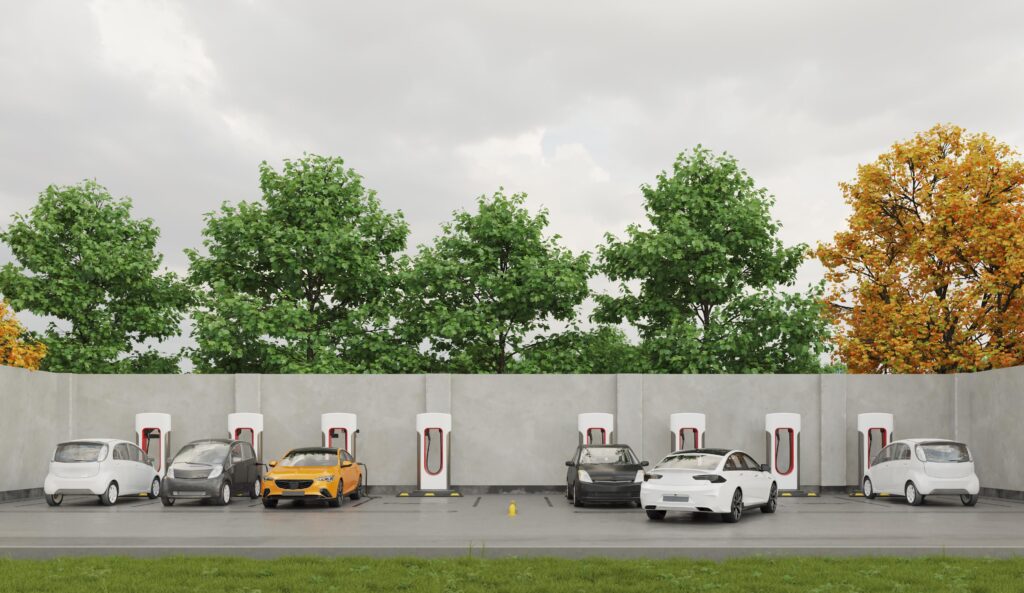Electric vehicles (EVs) are rapidly changing the way we drive, offering a cleaner, quieter, and more sustainable mode of transport. But one of the most common questions for those considering making the switch is: “How long does it take to charge?” The answer, like most things EV-related, depends on a few key factors, including the size of your car’s battery, the type of charger you’re using, and even the weather.
This blog post focuses on 7kW chargers – a popular choice for home and workplace charging – to help you understand how they work and whether they’re the right fit for your EV lifestyle.

What is a 7kW EV Charger and Why is it So Popular?
A 7kW charger is a Level 2 charging station that delivers 7 kilowatts of power to your electric vehicle. It uses alternating current (AC) power, the standard electricity supply in homes and businesses. Unlike the standard 3-pin plug you might use for a kettle, this type of charger requires a dedicated circuit and professional installation by a qualified electrician.
Compared to a standard 3kW home socket, a 7kW charger provides significantly faster charging speeds. It’s also slower than more powerful options like 11kW and 22kW chargers (which often require a three-phase power supply, less common in homes) and considerably slower than DC rapid chargers found at motorway service stations and public charging hubs. However, they offer an excellent balance of speed, cost, and convenience for many EV drivers.
How Many Miles of Range Can You Add Per Hour with a 7kW Charger?
This is the question everyone wants answered! But there’s no one-size-fits-all answer. A 7kW charger typically adds around 25 to 30 miles of range per hour. However, several factors influence this:
- Battery Size: A larger battery capacity will naturally take longer to charge. Imagine filling different-sized containers with the same hosepipe.
- State of Charge (SoC): Charging speeds can vary depending on how full or empty your battery is. EVs often charge faster when the battery is at a lower SoC.
- Temperature: Extreme temperatures, both hot and cold, can affect charging efficiency.
- Vehicle Model: Different EVs have different onboard chargers that can handle varying levels of power. Some may accept the full 7kW, while others might have a lower limit.
To illustrate, let’s consider some popular EV models:
- Nissan Leaf (40kWh battery): A full charge from 0% to 100% might take around 5-6 hours.
- Tesla Model 3 (57.5kWh battery): Expect a full charge to take around 7-8 hours.
- Kia e-Niro (64kWh battery): A full charge could take approximately 8-9 hours.
Remember these are estimates. Always refer to your vehicle’s owner’s manual or the charging station manufacturer for the most accurate information.
The Benefits of 7kW Home Charging
For many EV drivers, a 7kW charger is the ideal solution for home charging. Here’s why:
- Overnight Charging: These chargers are perfect for overnight charging. Plug in when you get home from work, and wake up to a fully charged car ready for your day.
- Convenient and Cost-Effective: While not as fast as rapid chargers, 7kW charging is significantly quicker than using a standard 3-pin socket. Plus, it’s generally more cost-effective than public rapid charging, especially if you can take advantage of off-peak electricity tariffs like Economy 7.
- Reduced Battery Strain: While rapid charging is great for quick top-ups on long journeys, frequent use can put more strain on your EV’s battery over time. This type of charging is gentler on the battery, potentially extending its lifespan.
7kW vs. Other Charging Speeds
- 7kW vs. 3kW: A 7kW charger is more than twice as fast as a standard 3kW home socket. This means less time waiting for your car to charge and more time on the road.
- 7kW vs. 11kW/22kW: These higher-powered chargers offer faster charging times but often require a three-phase power supply, which is less common in homes and can be expensive to install. For most homeowners, a 7kW charger provides ample speed for daily driving needs.
- 7kW vs. Rapid Chargers: Rapid chargers (50kW and above) are ideal for long journeys and quick top-ups when you’re out and about. However, they are more expensive to use and can put more strain on your battery in the long run. 7kW charging is a more sustainable and cost-effective option for daily charging.
Maximising Your Charging Experience
- Pre-heating Your Battery: If your EV has a pre-heating function, use it during cold weather. A warm battery charges more efficiently.
- Use the Right Cable: Ensure you’re using the charging cable that came with your vehicle or a compatible one that supports 7kW charging.
- Smart Charging: Explore smart charging features that allow you to schedule charging during off-peak hours when electricity rates are lower. Many energy suppliers offer special EV tariffs with cheaper rates overnight.
- Charging Etiquette: Be mindful of others when using public chargers. Avoid “hogging” the charger if you don’t need a full charge, and be sure to move your car once it’s finished.

The Future of Home EV Charging?
As EVs continue to grow in popularity, 7kW chargers are set to become the standard for home charging. They offer a practical and efficient solution for most EV drivers, providing a good balance of charging speed, cost, and convenience.
By understanding how 7kW chargers work and following the tips outlined in this blog post, you can make the most of your EV charging experience and enjoy all the benefits of electric motoring. Speak to our experts at The Full EV to find out more or to book your home, school or workplace charger installation.


